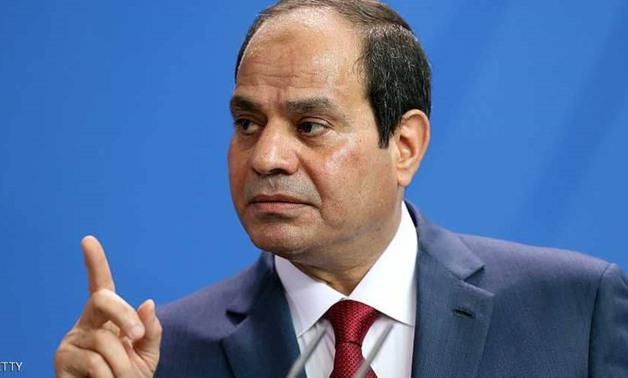
FILE - President Abdel Fatah al-Sisi
CAIRO - 26 September 2019: In a meeting with a number of U.S. influential figures, President Abdel Fattah el-Sisi said Egypt has started diplomatic escalation to expand the domain of discussions on the Grand Ethiopian Renaissance Dam (GERD) so it becomes no longer confined to a bilateral or trilateral level.
The president underlined that Egypt has always adopted policies that favor dialogue, emphasizing that the dam will not be operated by the “imposition of a status quo.” “We have no other water source but the Nile River,” the president stressed.
Sisi pointed out that 95 percent of Egypt’s surface is desert. “Any harm to [our] water shares will have a destructive impact on Egyptians...We are accountable for our citizen’s security,” the president added.
“We are not against development [in Ethiopia]. We want all of us to live and grow. Each country has its challenges and we are not against the construction of dams but not at the expense of Egypt [‘s interests] and causing it harm,” President Sisi said.
The president clarified that in 2015, Egypt and Ethiopia agreed on mechanisms to fill the reservoir within the Declaration of Principles, but technical committees failed to reach an accord.
“It is a must to come to an agreement… so we can control the amount of damages we can endure after the completion of the dam,” the president said, highlighting that Egypt already suffers from water poverty, whose level will go up because of the population growth. The country has the largest population in the Middle East at over 97 millions.
Sisi stressed that any state is normally not exposed to dangers, particularly those related to water shortages, unless it goes through a phase of weakness. He cited the situation of Iraq, which used to receive 100 billion cubic meters of water annually by 1990, but today only gets 30 billion cubic meters per annum.
He said one of the challenges that ensued from “the 2011 events” is the construction of GERD, impacting Egypt and its people. He added that it was supposed that negotiations would have taken place with the Ethiopian side if the Egyptian state was present at the time. “When the Egyptian state weakened, there was a price paid by Egyptians and there will be a price to be paid by future generations.”
CAIRO - 17 September 2019: Another round of talks on the Grand Ethiopian Renaissance Dam (GERD) is scheduled to take place in Khartoum in October, after a two-day meeting in Cairo could not touch the technical issues.
The problematic point between Egypt and Ethiopia is a technical one related to the period of filling the dam’s reservoir with water. Ethiopia asked for 5-6 years to fill the reservoir, while Egypt asked Ethiopia to abide by the Nile water quantity flow in filling the reservoir to “avoid any significant damage on the downstream countries,” former head of the Central Department for Technical Cooperation at the Nile Sector of the Ministry of Water Resources and Irrigation Mamdouh Mohamed Hassan told Egypt Today in previous remarks. At least seven years filling the reservoir may not cause major drop in Egypt’s water share.
Cairo’s concern over its share was escalated after Ethiopia started building the dam on the Blue Nile in May 2011. A series of tripartite talks between the two countries along with Sudan has begun in 2014. One year later, the three countries reached an agreement, per which the downstream countries should not be affected by the construction of the dam.
Both President Abdel Fattah el-Sisi and Ethiopian Prime Minister Abiy Ahmed affirmed their keenness to resume the negotiations between Ethiopia, Egypt and Sudan.
Additional reporting by Samar Samir
Comments
Leave a Comment